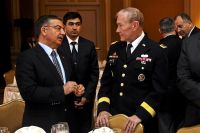WASHINGTON, Nov. 2, 2011 — The United States and Turkey are allies with common interests on most issues and an increasing partnership, the chairman of the Joint Chiefs of Staff said at the 30th Annual Conference on U.S.-Turkish Relations here yesterday.
Army Gen. Martin E. Dempsey called for the relationship between the two countries to continue expanding, acknowledging that they won’t always agree. “As our partnership grows, … we may have an occasional difference or two,” Dempsey said. “That is OK. In fact, in some ways, this is healthy for two free and sovereign nations.”
The biggest disagreement between the two nations occurred in 2003, when Turkey did not allow U.S. troops to transit its territory at the start of Operation Iraqi Freedom.
Turkey is at the crossroads that serves as a bridge between eastern and western and Europe and the Middle East. It has had a vibrant economy as the rest of the region has undergone recession. With new governments emerging in the Muslim world, Turkey — a secular state with a majority Muslim population — can serve as a positive role model to leaders in the Middle East, Dempsey said.
The chairman echoed Secretary of State Hillary Rodham Clinton, who spoke to the conference Oct. 31.
“I have to confess that some Americans, including quite a few on Capitol Hill, have questions about the future of this vital partnership,” Clinton said. “And they wonder about its durability, and they wonder about the future role that Turkey will play in the region. I want to emphasize that the United States welcomes Turkey’s growing role in the region and on the world stage.
“Now, we do not always see eye to eye,” she continued. “In fact, no two nations — or two friends, or even two members of the same family — ever do. But we are confident that as Turkey assumes the responsibilities that come with increased influence, our partnership will become even more productive in the years ahead.”
Turkey is a solid military ally that deployed a brigade to fight alongside U.S. troops in the Korean War, served as a steadfast ally during the Cold War and continues to play a constructive role with 1,800 service members in Afghanistan today, Dempsey said last night.
“Turkey has also positively engaged Iraq, working with Iraqi leaders to reinforce that nation’s emerging democracy and helping it rebuild,” the chairman added.
Terrorists have targeted both Turkey and the United States, Dempsey noted, and the two nations continue to work together to combat terrorism.
“Rest assured,” he said, “the United States stands with Turkey in this struggle, and we will continue to provide counterterrorism support and help crack down on terrorist activities around the world.”
Dempsey extended the sympathies and prayers of the 2.2 million men and women in the U.S. armed forces for the loss of life and devastation of the recent magnitude 7.2 earthquake in eastern Turkey.
“We’ve been very proud to play even a small part in helping you recover from that,” he said. “You know and can be sure that our country is committed to you as you recover and rebuild, and we’re proud to call you our friends.”
Dempsey said he is confident that the United States and Turkey will continue to focus on the common ground the two countries share to forge an even deeper partnership in the future.
“We must stay engaged and keep communicating,” he said, “because as our already strong relationship grows in breadth and depth, we have to move beyond the world of labels. We need to move beyond the old paradigms of East and West, Christian or Muslim, New World or Old World, and on to building a bold and bright and new future together.”
The chairman added a personal note, telling the audience that the day marked his one-year anniversary of being cancer-free.
“Last year I had cancer,” he said. “You can’t imagine how that changes your perspective on things. It allows you … to see things and empathize with people more than, perhaps, I’m sorry to say, I did before.”
Turkish Defense Minister Ismet Yilmaz attended the meeting after having met with Defense Secretary Leon E. Panetta at the Pentagon earlier in the day.
“The two leaders discussed a broad range of mutually significant security issues, to include defense-industrial cooperation, foreign military sales, the common threat of terrorism and regional challenges,” Pentagon spokesman Navy Capt. John Kirby said in a written statement.
Panetta reassured Yilmaz of America’s commitment to a strong security relationship with Turkey, praised Turkey’s contributions to the training mission in Afghanistan and pledged to continue assisting in earthquake relief efforts, should that support be required, Kirby added.
Source:
U.S. Department of Defense
Office of the Assistant Secretary of Defense (Public Affairs)

 von
von 
